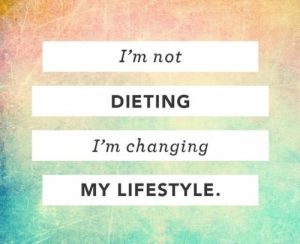 How many times have you started dieting, lost your weight and then gained it all back within a few weeks or months of ending your diet? How many times have you dieted and in one horrible evening, ended the diet and all the progress by stuffing your self with the diet’s forbidden foods. Diets always fail, but making lifestyle changes don’t. Making lifestyle changes means learning to eat healthier and make smarter choices when it comes to food.
How many times have you started dieting, lost your weight and then gained it all back within a few weeks or months of ending your diet? How many times have you dieted and in one horrible evening, ended the diet and all the progress by stuffing your self with the diet’s forbidden foods. Diets always fail, but making lifestyle changes don’t. Making lifestyle changes means learning to eat healthier and make smarter choices when it comes to food.
Whether you’re counting calories or carbs, eating a “special, magical food” or following a guru’s recommendation, diets don’t work.
You’ll feel deprived and often hungry when you diet. There are often a plethora of do’s and don’ts that you must follow or the diet end. When it end, you not only go back to old eating habits, you also regain the weight you lost and sometimes even more. Nothing has changed. You still crave that candy bar at three in the afternoon and buy a few boxes of cookies at the grocery. It’s no wonder you regain the weight.
A change in lifestyle means eating healthier and making permanent changes.
Lifestyle changes means changing habits and making smarter choices. You’re not really making any kind of permanent change when you go on a cabbage soup and lemonade diet—or whatever kind of crash diet you chose. That’s because these were not meant to be used for longer periods. They’re not nutritionally balanced and they’re extremely boring after a short period. Learning to make smart substitutions, such as having healthy snacks available, like an apple, to offset that hunger mid afternoon so you don’t look for a candy bar. Even making small changes, like substituting brown rice for white rice also adds more nutrients with fewer calories.
Lifestyle changes mean learning to cook differently.
How you cook your food is as important as what you cook. If you’re breading and frying everything, you’ll benefit from learning how to steam, grill or bake your dishes. Changing a recipe may be in order. Consider using applesauce to substitute for sugar or oil in cakes or muffins. Filling up on vegetables with more servings per meal is also part of a healthy diet.
- Do you have to give up some of your favorite dishes? You can still eat them, just in smaller portions and not as often.
- A program of regular exercise also is part of a healthy lifestyle. It not only burns calories and builds muscle tissue, it can also help prevent serious conditions like diabetes and heart disease.
- Adequate hydration is also part of a healthy lifestyle. The body requires approximately 8-eight ounce glasses a day.
- While you might get sample meal plans at first, until you learn how to eat healthier. Once you understand a healthy way of eating, you can eat anywhere. Even if you overeat one day, you simply go back to normal eating the next.
